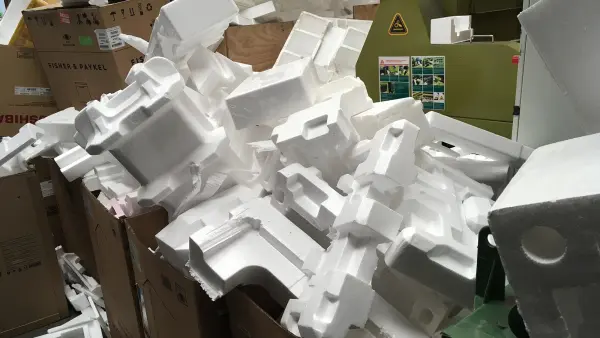Polystyrene is everywhere around us…
Polystyrene is one of those materials that’s everywhere around us, and half the time we don’t even realise. Polystyrene is an inexpensive plastic and probably only polyethylene is more common in your everyday life. (You will find this in children’s toys, plastic bags and soft drink bottles).
The outside housing of your computer is probably made of polystyrene, as well as the housings of things like hair dryers, TVs and kitchen appliances like your fridge and microwave. Toy cars and airplanes are made from polystyrene, as well as many other toys, surfboards, boogie boards, food trays and the protective packaging and squishy foam chips still found around some fragile items. There’s also a lot in the moulded parts on the inside of your car, like the radio knobs and door interiors. Polystyrene is also used to make drinking cups and food containers – the harder plastic ones and also the soft white Styrofoam ones.
Highly toxic to humans and wildlife…
Polystyrene contains the toxic substances Styrene and Benzene. Both are suspected carcinogens and neurotoxins that are hazardous to humans. When hot foods and liquids touch Polystyrene they start a partial breakdown releasing some of these toxins to be absorbed into our bloodstream and tissues. Never ever heat food or drinks up in this packaging- or have hot food or drinks served in them – push back if your local takeaway shop offers food in Polystyrene boxes.
Styrene is a neurotoxin, and it attacks the central and peripheral nervous systems. The accumulation of this highly fat-soluble chemical in the tissues of the brain, spinal cord, and peripheral nerves are connected with acute or chronic functional impairment of the nervous system. The same damage occurs to all mammals- so it is very important to keep these chemicals out of our soils and our food chain and away from pets.
Polystyrene’s environmental impact is second highest, behind aluminium, when we look at the way it is manufactured, it’s effect on greenhouse gases and the effect it has on the environment. Polystyrene products are made with petroleum, a non-sustainable and heavily polluting oil resource.
Extruded polystyrene (EPS) – the lightweight white version of polystyrene is usually made with hydro chlorofluorocarbons which have a major effect on ozone depletion and on global warming. Their ozone depletion potential has 1000 times greater effect on global warming than carbon dioxide. If Polystyrene is burned it releases these noxious chlorofluorocarbon gases and the neuro toxic chemicals into the ozone layer causing terrible damage to our air quality and increasing greenhouse gases.
Damage to our oceans…
The United Nations Environment Program estimated in 2006 that every square mile of ocean hosts 46,000 pieces of floating plastic. Polystyrene foam presents unique management issues because of its lightweight nature, floatability, and likelihood to be blown from disposal sites even when disposed of properly. The lightweight and buoyant polystyrene travels easily through gutters and storm drains, eventually reaching the ocean.
Plastic from urban runoff is the largest source of marine debris worldwide. Pollution of waterways and the waterfront negatively affects tourism and quality of life. When polystyrene travels down waterways and storm drains into the ocean, it breaks down into smaller, non- biodegradable pieces that are ingested by marine life and other wildlife thus harming or killing them.
It takes at least 500 years to decompose.
When polystyrene is sent to the landfill, it is quickly covered by other rubbish and soil and this process deprives it of water and oxygen, which would normally help it to break down.
Much of the polystyrene we throw into landfill today will therefore still be around in 500 years, leaching those awful chemicals into the soils.

So, what can we do about it and what are councils doing?
Polystyrene is not an item you can put into the kerbside recycling bin, so we need to reduce the use of polystyrene and say no to it where we can. It is advised by many of the NZ Councils to return your Polystyrene packaging to your place of purchase as many of these businesses operate a commercial EPS (Polystyrene) Recycling scheme.






